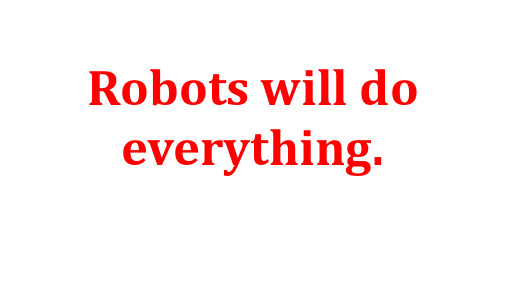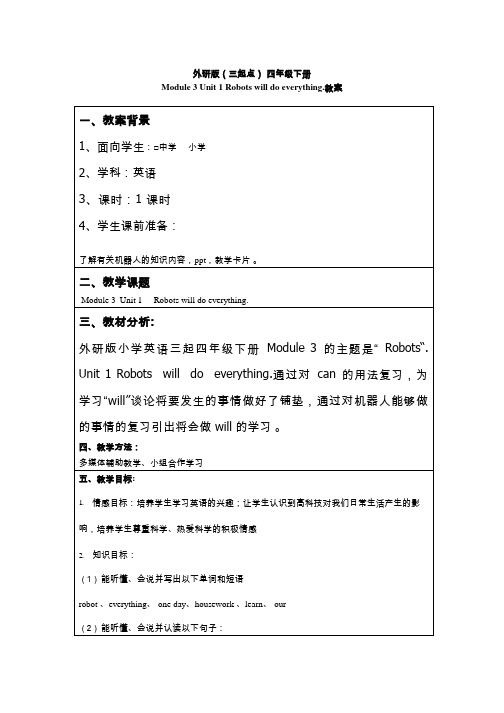外研版(三起)四年级英语下册Module 3 Unit 1robots will do everything PPT课件
- 格式:ppt
- 大小:4.01 MB
- 文档页数:33

Module 3 Unit 1 Robots will do everything.优秀教案一、教学目标:1、能听说读写单词:robots / one day /housework/ learn/ everything、our2、能掌握句型:Robots will do everything.Will they ```?Yes, they will. / No, they won’t.二、教学重难点:1、重点:用will 谈论将来可能发生的事情。
2、难点:can 和will 的区别。
3、谈论机器人现在具备的功能,和将来能做的事。
三、教具准备:点读笔、幻灯片、单词卡片、机器人模型,机器人贴贴四、教学过程:Step1 Warming up1、Greetings.Ss: Good morning ,Ms Feng.T: Good morning boys and girls.T: How are you ?Ss:… .Step 2 ReviewT: We have learn module 3 , lets play a game and review the words.Ss: Ok.a.抢读单词:幻灯片上,将M3 的单词弹跳到圆圈里呈现出来,会读的同学站起来并大声的读出来。
(学生抢读单词,增加课堂趣味性,可以一下子激发课堂的氛围。
)T: Ms Smart will have a picnic on Sunday. What about them?S: Amy will fly a kite.(看图回答)Lingling will swim.Sam and Daming will play football.T: What about you ?S: I will```(用上一个模块的内容复习“will”的用法,为接下来的新课学习做铺垫。
)Step 3 Lead inT: Good job! Today, we will learn our new lesson. Guess, what’s this?a.出示一幅图片,请同学们猜猜是什么。


Module3 Unit1 Robots will do everything.一.教学目标1.能够听,说,认读下列单词:our,have,robot,will,everything,housework,learn,homework, one day,1.能够使用“主语+will +动词(原形)....”句型来表达谁将会做什么。
2.情感目标:学会制定自己的学习计划。
二.教学重点1.教授单词:our,robot,will,everything,housework,homework....2.如何使用句型:主语+will +动词(原形)....3.初步了解一般将来时。
三.教学难点:1.教授较难单词:robot, everything,housework, homework.2.讲解Will 引导的一般将来时:主语+will +动词原形...3.复习之前学习过的动词:walk, talk, sing,dance,swim,do,help.四.教学过程Step1: Greeting and Warm upT:One, two.S:Three, four.T:Class begins.S:Good afternoon, teacher.T:Good afternoon,boys and girls!Let’s chant!(一边chant,一边做动作。
)T:Great! I’ll divide you into two groups:Group A &Group B.If you did a good job, I’ll give you one start .(一定要在课堂伊始就分组,方便两组形成竞争,课堂上的各种好或者不好的表现都可以用加减分来控制)Step2:PresentationT:We are human. So,we can talk.We can jump.We can sing and dance. And there is a robot, it can do something too. Let’s watch the video.(播放活动二的视频)T:What can the robot do?S1:It can walk.T:Yes!S2:It can talk.Hello!T:Ha ha!You’re right.T:What will the robots do one day?Let’s watch the video and read after it. Then, you can talk about with your partners.(再次播放课文视频,每放一句就暂停一下让学生跟读。

教材分析课文情景是Daming和Sam关于机器人的对话,主要是谈论机器人现在能干什么和未来将会干什么。
对于学生而言,这是他们初次接触“will+动词原形”表示将来行为,因此在本课教师应创设真实语境以便帮助其理解和运用。
课时教学目标一、语言能力目标1. 掌握本课单词及短语:robot, will, everything, housework, learn, our, homework, won’t=will not,one day, do the housework, help children learn, do our home work;2. 掌握核心句型:They will help children learn.They will do the housework.They will…3. 能运用will来描述将会发生的事。
二、学习能力目标1. 通过模仿、询问、应答等学习方法习得语言;2. 能在图片、音视频的帮助下理解文本内容;3. 能在课堂交流中注意倾听,在教师的引导下梳理、提炼文本关键信息,积极思考和讨论。
三、思维品质目标学生能在学习对话及阅读文本的过程中,通过自主思考、交流讨论等,逐步形成观察、分析、概括的思维品质,help children learn. What can you do?Ss: I can...2. 出示课题:Module 3 Unit 1 Robots will do everything . 垫。
(about 3 minutes)Step 2: Lead in 1. Look and say观察图片,通过教师的问题引领What can Sam / Amy do? 引出chant的内容。
2. Watch and chant看动画,学唱歌谣。
3. 听音看图说一说。
T: Who is coming?Ss: It’s a robot.(自然拼读新授单词:robot)T: It’s Daming’s robot.It can do a lot.Chant导入,通过朗朗上口的歌谣培养学生的语感;然后对活动一图片进行了整合,让机器人走进画面,自然过渡到主课文,从而引出本课课题。

外研版小学英语四年级下册Module3Unit1教材内容全解Module3Unit1教材内容全解Module3Unit1 Robots will do everything.机器人将会做所有事情。
1.Listen and chant.听一听并说唱。
【课文全译】Sam can ride a bike. 萨姆会(能)骑自行车。
He can ride his bike. 他会(能)骑他的自行车。
Amy can fly a kite. 埃米会(能)放风筝。
She can fly her kite. 她会放(能)她的风筝。
【课文注解】can(情态动词)能,会,用于一切人称(第一、二、三人称都用can,没有第三人称单数形式),且can后必须跟动词原形,含有can的句子变为否定句在can后加not(缩略形式can’t),一般疑问句把can提到句前放句首(在主语之前),肯、否回答用can 来回答。
如:I can play football.我会踢足球。
She can point to the window.她能指着窗子。
They can not(can’t)play basketball.他们不会打篮球。
Can you ride a bike? Yes,I can./No,I can’t. 你会骑自行车吗?是的,我会。
/不,我不会。
对What can+主语+do?例如:(对画线部分提问)What can Sam do? 【拓展记忆】Can的用法:1. (表示能力、功能)能,会。
The classroom can seat thirty students.这教室能坐三十位学生。
June can drive now. 琼现在会开车了。
2. (表示可能性)可能,可能会。
I think the work can be completed ahead of time. 我认为这项工作能提前完成。
3. (表示允许、请求)可以。

Module 3 Unit 1 Robots will do everything.【课题】Module 3 Unit 1 Robots will do everything.【学情分析】本单元主要语言功能是继续学习用“will”谈论将来可能发生的事情。
本单元的内容主要是以学生喜闻乐见的“robot”为主体,以“Robots will do everything. Will they …….?”为主要句型,使学生能够从自身兴趣出发,在真实的语言环境中,积极运用所学知识,探讨机器人的未来发展趋势。
接下来的第二单元内容同样围绕这一主线,所以本单元的内容起到了承上启下的作用。
【教学目标】1. 语言目标:(1)学生能听、说、认读词汇:robot, will, everything, housework, learn, our, homework, won’t及词组one day, do everything, do the housework, do homework, help children learn。
(2)学生能运用句型:It can …及It/They will …2. 技能目标:(1)学生能在插图的帮助下理解故事的主要内容,朗读故事人物的对话。
(2)学生能进一步熟练运用句型:It can …表达物品的功能,及运用It/They will …表达将来可能发生的事情。
3. 情感目标:体会父母的辛劳,培养勤做家务的美好品德。
【教学重点】1. 学生能听、说、认读本单元的重点词汇及词组。
2. 学生能运用核心句型:It can …表达物品的功能,及will表示一般将来时的用法。
【教学难点】1. 区分housework和homework。
2. will表示一般将来时的用法。
【教具/学具准备】PPT、图片、卡片、人物头饰等。
【教学过程】Step 1 Warming up and Revision1. Greetings. (师生间进行简单的问候。
四年级英语下册教学设计-Module 3 Unit 1 Robots will doeverything.(6)-外研版(三起)教学目标1.学生能够理解并能正确使用单词和短语:robot, everything, help, clean, cook, dance, sing, play basketball, do housework, do sports。
2.学生能够进行听说读写综合运用,并能自己创造出新的语句。
3.学生能够展示出积极的学习态度,参与教学活动,完成教学任务。
4.学生能够了解到智能机器人在现实生活中的应用。
教学重点1.学习并正确使用单词和短语:robot, everything, help, clean, cook, dance, sing, play basketball, do housework, do sports。
2.进行听说读写综合运用,自己创造出新的语句。
教学难点1.学生能够在语境中运用所学单词和短语。
2.学生能够自己创造出新的语句。
教学方式听说读写综合运用教学准备1.一些机器人玩具模型和图板。
2.合适的录音和视频素材。
3.学生的练习本。
教学过程1.Warming-up–T: Hello everyone. In our last class, we learned about robots. Do you still remember what we studied?–Ss: Yes!–T: Great! Now, let’s play a game. I will show you some picturesof robots, and you need to name them. Are you ready?–Ss: Yes!2.Pre-task–T: Ok, now let’s talk about robots again. Do you think robots are important? Can they help us? What can they do? Please discuss with your classmates first.–Ss: …–T: Alright, now let’s watch a short video to see how robots help people. Please pay attention, we will have a quiz afterwards.3.While-task–T: Now, let’s move on to our new lesson. In this unit, we will learn how robots will do everything and what they can do. First, let’s learn some new words. Please follow me to read the words after me: robot, everything, help, clean, cook, dance, sing, play basketball, do housework, do sports. Now, let’s use these words to make sentences. Please work in pairs and write down at least three sentences.4.Post-task–T: Great job, everyone! Now, let’s check the sentences you made. Who wants to share the sentences they wrote with us?–Ss:–T: Good job! Can anyone else share more sentences with us?–Ss:–T: Excellent! We all did a great job. Now, let’s do some writing practice. Please write down the sentences you just shared in your exercise books.5.Extension–T: For the homework, please watch the video again and write downat least three things you learned from it. Don’t forget to use the words we learned today in your writing.教学评价•通过展示、游戏、小组合作等活动方式激发学生的学习兴趣。